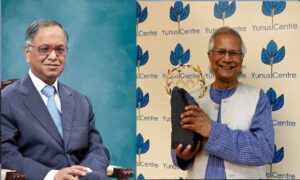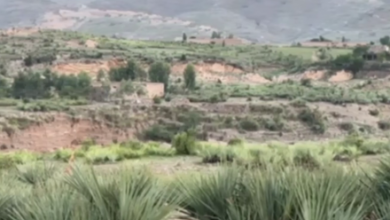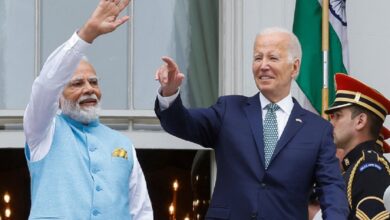Dr. Yunus’ thoughts are much needed in today’s turbulent world: Narayan Murthy
Sheikh Hasina left the country and fled to India after being ousted from power on August 5 in the face of the deadly movement of students. In the changing situation of the fall of the government, one-sided news about Bangladesh began to appear in the Indian media. In between, half-truth rumors and misinformation take place.
From India’s ruling party to civil society, Hasina has come to be seen as the most trusted and loyal. The reason for this loyalty around Hasina is that Awami League has unconditionally given importance to Indian interests during the last 15 years of rule.
Nobel laureate economist Dr. Muhammad Yunus. After the fall of Hasina, the common people of Bangladesh have no end of expectations around Yunus in this challenging time. However, there is concern in Indian circles around Yunus. Most Indians fear, Yunus is anti-India.
However, Indian billionaire NR Narayan Murthy did not walk this path. He said on August 6. Wrote an article in The Print praising Yunus. He commented that Yunus’ thoughts are needed now more than ever in these turbulent times. Narayan Murthy’s son-in-law is former British Prime Minister Rishi Sunak of Indian origin.
Here is the Narayan Murthy article for readers –
Entrepreneurs from South Asia and its surrounding regions have been the main source of business for the past half century. The modern world is increasingly dependent on their contributions. Government stimulus policies in India and beyond are accelerating their rise and benefiting their contribution to the global economy and society.
Many of these entrepreneurs are expanding profitable businesses using modern technology, thereby enabling others to own assets and helping to create a positive attitude of this talent of entrepreneurs in the society. These entrepreneurs have established world-class organizations that are having an effective impact on solving social and environmental problems in creative ways. Some of the companies they founded are profitable and some are non-profit.
Besides, there are several institutions of hybrid nature. What all entrepreneurs have in common is their innovative thinking on societal issues such as poverty, illiteracy, disease and climate change. their
This thinking actually helps to positively impact the capital markets, technology and individual level to change the entire nation.
Among the entrepreneurs, an important figure in this region is the Nobel Peace Prize winning economist of Bangladesh, Professor Dr. Muhammad Yunus. Who had the opportunity to become a teacher at the United States University in the mid-seventies of the last century.
But he returned to post-independence Bangladesh and established at least dozens of institutions through years of tireless work. Every institution built by him is world class. Not only for Bangladesh, he has established his institutions for the welfare of the whole world. His model of social development is now being studied worldwide. People are now doing research on these issues. His models are also being used in regions as diverse as the Philippines, the United States, Kenya and India.
There is no denying his influence on the thinking and work of a generation of traditional and social entrepreneurs. Of course he is best known for founding the Grameen Bank. This bank has a great role in creating employment for the poor women of the society. Today we know about the idea of microcredit to bring back financial clarity to the world’s poor. But until Dr. Yunus has shown us how this idea can be applied to society at large, until the idea of microcredit seemed absurd to us.
With this microfinance concept he has done something that was once unthinkable to us. Yunus’ role was unique in making Grameen Bank a world-class institution from day one. Through this the world economy has got a new form. Under his leadership, Grameen Bank successfully proved that a microfinance institution can be a viable business. Grameen Bank’s loan recovery rate was over 96 percent, even though the bank does not accept any collateral for lending.
But many do not know that Dr. Yunus’ work goes beyond microfinance. Over the past two decades, he has pioneered a model for entrepreneurship that he calls ‘social business’. Later, through this, he created dozens of organizations that would contribute to the betterment of society through positive contributions in the fields of health, education, environment and sports. Incredibly, at 84, he remains as dynamic as ever. He travels the world to convey his thoughts to new generations.
In today’s volatile world, we need Yunus and his ideas more than ever. His ideas are very effective in small and least developed countries and regions including India. Supporting Yunus in this mission is very important. In particular, he should be given opportunities to apply his ideas and energies to individuals, institutions, government and academia. So that he can do whatever he wants to do. I hope that any free society. Hope to benefit from the great work of Yunus and let him continue his great work uninterruptedly.
Businessmen often talk about how to create a business environment in society. Besides, social entrepreneurs also think about this issue. In this regard, India needs to create an agenda through which social business outside the country, investment, social stock exchange and the like are encouraged. In this case, leaders like Yunus have no choice but to encourage and support creative skills.
Like Action for India which is interested in building a thriving ecosystem for social entrepreneurs. This year’s Paris Olympics Dr. Yunus’ influence has caught everyone’s attention. He proposed that this year’s Olympics be held in rural France so that, once the Games are over, housing and related infrastructure can be afforded to low-income Parisians. The organizers accepted his idea and made him one of their honored guests and partners.





